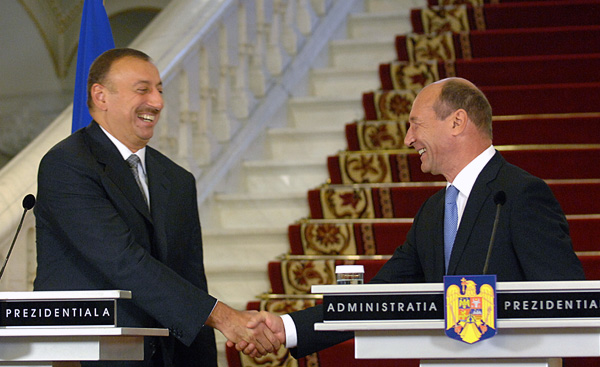
Azerbaijan can Resort to Multiple Options for its Gas Exports
Publication: Eurasia Daily Monitor Volume: 6 Issue: 194
By:

Countries and companies along the Nabucco route in Europe (Bulgaria, Romania, Hungary, Austria, Germany) as well as Greece, Italy, and Switzerland are all expressing interest in purchasing Azerbaijani gas. If Turkey continues to block the transit agreement and if the E.U. and the U.S. fail to pull their weight with the AKP government, Azerbaijan can resort to alternative solutions for its gas exports.
Baku is now actively considering other markets and pipeline options. On October 14 Azerbaijan’s State Oil Company signed an agreement with Gazprom for an initial volume of 500 million cubic meters in annual deliveries to Russia, starting on January 1, 2010. The small volume is susceptible to further increases at any time, without upper limits other than those of Azerbaijan’s own gas surplus. The Russian purchase price is apparently equivalent to European netback prices. Moreover, this agreement apparently precludes the re-export of Azerbaijani gas by Gazprom to third countries at Azerbaijan’s expense (EDM, October 15).
Baku is also considering the possibility of starting gas exports to Iran, initially in small volumes, by early 2010. Iran is already importing Turkmen gas for consumption in Iran’s northern provinces. Those volumes, however, do not fully meet requirements there. Iran intends to import additional volumes of gas for off-season storage and peak-season consumption. This creates a market for Azerbaijani gas in northern Iran (Trend, October 17).
No third country transit solutions are necessary for Azerbaijani gas to reach Russia or Iran. Nor is the construction of new pipelines necessary. Pipeline connections to Russia and to Iran existing since the Soviet era, now require modernization of lines and compressors. Pipelines in both of these directions add up to approximately 10 billion cubic meters (bcm) in annual capacities. These can accommodate Azerbaijan’s annual export surpluses for the next few years, in the event that the Nabucco project falters, or if Turkey’s AKP government remains uncooperative on pricing and transit terms for Azerbaijani gas.
Azerbaijan plans to upgrade the Baku-Novo Filya and Gazimahomed-Mozdok pipelines for gas exports to Russia’s North Caucasus territories. These Soviet-era pipelines can easily be adapted for use in the reverse-mode. Their combined capacity (after upgrading) would enable Azerbaijan’s State Oil Company to deliver up to 7 bcm of gas to Russia annually, according to the company’s president Rovnag Abdullayev (APA, October 19).
Similarly, Azerbaijan plans to upgrade the Gazakh-Astara and Gazimahomed-Astara gas pipeline links to Iran. Pending this, Iran’s gas storage authority is expressing interest in using gas storage sites on Azerbaijan’s side of the common border, with a view to using those gas volumes during winter in northern Iran (Trend, October 17, 19).
During the October 16 session of Azerbaijan’s government (EDM, October 21), President Ilham Aliyev clearly alluded to the proposed White Stream pipeline as a possible option for Azerbaijan’s gas exports (www.day.az, October 17). White Stream is being proposed by a London-based project company to carry Azerbaijani and Turkmen gas via Georgia and the seabed of the Black Sea to Romania and onward into E.U. territory (an earlier, now-discarded version would have run on the seabed to Ukraine). White Stream is one element in the E.U.’s Southern Corridor concept, designed to increase capacity and security of transportation for Caspian gas to Europe.
Aliyev discussed the White Stream proposal for the first time with the Romanian President Traian Basescu in late September in Bucharest, where the two presidents signed a strategic partnership agreement. In parallel, Azerbaijan’s State Oil Company intends to examine the option of gas liquefaction for export via the Black Sea to E.U. territory. According to company president Abdullayev, “we are ready to review these forward-looking proposals in detail” (APA, October 20). Consideration of the Black Sea options suggests that Turkey does not necessarily enjoy a monopoly on gas transportation from the Caspian basin to Europe; and that Turkey can ultimately be circumvented, if the AKP government overplays its hand.
The AKP government’s gas conflict with Azerbaijan is two years older than the Turkish-Armenian political normalization, which is now taking its first, uncertain steps. The two processes have no relationship to each other and Baku insists on keeping them separate. Meanwhile, Ankara’s price extortion and its delaying tactics on the transit agreement have hurt Azerbaijan financially in two ways: by cutting into Azerbaijan’s annual export revenues and by slowing down the development of Azerbaijan’s Shah Deniz field, the main designated source for the Nabucco pipeline.
Baku’s October 16 response and its follow-up measures seek to concentrate attention in Brussels and Washington to a festering situation that puts Nabucco and the Southern Corridor at risk. According to Aliyev, at the government session, Ankara’s “unacceptable terms proposed to us may lead to a failure of this entire project” (www.day.az, October 16). While Azerbaijan is irreplaceable as a producer as well as a transit country, Turkey is not irreplaceable.




